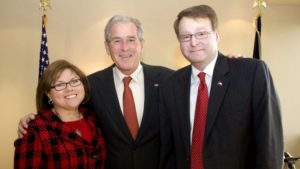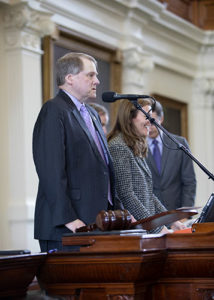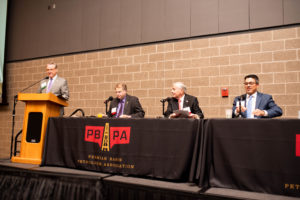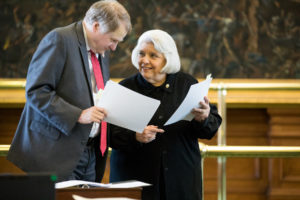Serving His Country
 On September 11, 2001, Brian Birdwell was on the Department of Army staff as the military aide to the deputy assistant chief of staff for installation management at the Pentagon.
On September 11, 2001, Brian Birdwell was on the Department of Army staff as the military aide to the deputy assistant chief of staff for installation management at the Pentagon.
Birdwell and two of his coworkers, Cheryl and Sandy, were watching events unfold in New York City and knelt to pray for those in the Twin Towers.
“There was no thought that we were next in any way, shape or form,” he recalled.
Birdwell excused himself to the restroom, having no idea those were the last words he would ever speak to Cheryl and Sandy. Minutes later, as Birdwell returned from the men’s room, terrorists slammed the 80-ton jet into the Pentagon, killing 125 people in the building and an additional 59 people (not including the terrorists) on the plane. Had Birdwell returned a few moments earlier, he would have been back in the office and perished with Cheryl and Sandy. Had he stepped out of the restroom a moment later, he would have been in the direct path of the plane. Birdwell would later learn he was the only one located that close to impact who would survive. Only at the time, survival did not appear to be an option—not even the remotest of possibilities.
“I was tossed around like a rag doll and set ablaze,” Birdwell recounted. He collapsed in pain, the back of his body burning away. It wasn’t a matter of surrendering, he explained, but rather one of acceptance.
“It is not will I live or die, but how long will it take me take me to die?” Birdwell shared. “I am not struggling to survive. This is how I am dying, and this is how the Lord is calling me into eternity.”
His thoughts turned to his wife, Mel, and his son, Matt, of the last goodbye that was now seemingly etched in permanence.
Birdwell was anticipating the departure of his soul, “waiting to see what the moment of death feels like,” when he felt liquid running down the side of his body. Miraculously, one of the sprinkler systems was still in working order and able to dispense sufficient water to extinguish the flames that were burning Birdwell’s body. He was eventually rescued and taken to Georgetown University Hospital; he was the only Pentagon casualty taken to that particular location.
“I had that entire hospital’s undivided attention,” Birdwell recounted, along with the care of a doctor who had special training in the treatment of burn patients. This detail, the presence of this particular specialist being at the hospital at that particular moment, was not coincidence, Birdwell maintained, but evidence of “the Lord putting people in the right place at the right time.”
Birdwell was burned over 60 percent of his body and would endure four years of recovery, including 39 surgeries, months of hospitalization, and numerous skin grafts.
“It was minute-by-minute dependence on God,” he declared.
Birdwell was awarded the Purple Heart for his wounds, and upon retirement in July 2004 he was awarded the Legion of Merit.
From 2004 to 2017, Brian and Mel operated Face the Fire Ministries, a non-profit organization they jointly founded to support critical-burn survivors and wounded service-members and their families. In 2004, the Birdwells jointly authored Refined by Fire: A Family’s Triumph of Love and Faith, which chronicles their life-changing ordeal; the book is available for purchase on Amazon. You may also view a personal video of Brian Birdwell’s story at http://www.iamsecond.com/seconds/brian-birdwell/.
Serving His State
 “The Lord put it on my heart to continue my service, and particularly in this role in the State Legislature,” Birdwell shared.
“The Lord put it on my heart to continue my service, and particularly in this role in the State Legislature,” Birdwell shared.
In June 2010 he won a special election to the Texas Senate, and five months later he was re-elected to serve a full, four-year term representing Senate District 22. Birdwell, who lives in Granbury, has remained in office since that time and is running for re-election this year. He currently represents the counties of Bosque, Ellis, Falls, Hill, Hood, Johnson, McLennan, Navarro, Somervell, and Tarrant (partial).
“Senator Birdwell’s service to our nation and his leadership in the Texas Senate are unparalleled,” shared Ben Shepperd, Permian Basin Petroleum Association (PBPA) president.
One of last year’s legislative goals set by the PBPA was to discuss the statewide value of the Permian Basin oil and gas industry with legislators who are not from the Permian Basin. Sen. Brian Birdwell did not need convincing; he already knew.
“Although not a Permian Basin senator, Brian Birdwell recognizes the value of our communities and the prosperity the Permian Basin produces for Texas, America, and her allies,” Shepperd observed.
When it comes to examining the relationship between the Permian Basin industry and the Lone Star State, Birdwell goes first to the state budget.
“It goes without saying that oil and gas industry activities are vitally important to balancing the state budget as the total tax revenue from the oil and gas production taxes typically ranks in the top five of tax revenue collections by category,” Birdwell detailed.
Revenues from the production taxes are divided primarily among three separate accounts: 37.5 percent to the Economic Stabilization Fund (ESF), 37.5 percent to the State Highway Fund (SHF), and the remaining 25 percent to the Foundation School Program. In fiscal years 2018 and 2019, the state collected a combined total of about $10.4 billion in oil and gas production taxes, and it is projected that it will collect a combined total of about $10.9 billion in fiscal years 2020 and 2021, Birdwell reported. It is projected that in fiscal year 2020 the ESF—more commonly referred to as the Rainy Day Fund—will receive $1.67 billion in transfers from severance taxes collected in fiscal year 2019, and $1.59 billion in fiscal year 2021 from severance taxes collected from in fiscal year 2020.
These figures speak to the direct impact of oil and gas industry activity on the state budget, Birdwell reiterated.
 “The indirect activities such as providing jobs, paying property taxes, etc. are difficult to quantify, but it is safe to say that the impact is exponential,” he added. “Oil and gas industry activity is vitally important to the state and helps to not only address emergency items that require one-time expenditures via the Rainy Day Fund, but is also crucial in funding two core governmental functions—providing transportation infrastructure around the state and educating our youth to become productive members of society,” Birdwell said.
“The indirect activities such as providing jobs, paying property taxes, etc. are difficult to quantify, but it is safe to say that the impact is exponential,” he added. “Oil and gas industry activity is vitally important to the state and helps to not only address emergency items that require one-time expenditures via the Rainy Day Fund, but is also crucial in funding two core governmental functions—providing transportation infrastructure around the state and educating our youth to become productive members of society,” Birdwell said.
On March 21, 2018, Birdwell was directly connected with the industry via his appointment as chairman of the Senate Natural Resources and Economic Development Committee by Lt. Gov. Dan Patrick. This Senate committee drives statewide policy on issues related to economic development, environmental permitting, water rights, air quality, and solid waste, along with oil and natural gas. The committee also oversees the Texas Railroad Commission (RRC), the Texas Commission on Environmental Quality, and the Texas Workforce Commission.
“Sen. Birdwell is a proven and respected conservative leader who will bring his no-nonsense approach to the important work of the Natural Resources and Economic Development Committee,” Patrick said upon appointing Birdwell.
By the time the Legislature adjourned, Birdwell had both authored and sponsored several bills important to the energy industry.
Birdwell sponsored House Bill 3557 to help protect critical infrastructure facilities in the state. These facilities are defined in the Texas Government Code and are related to oil and natural gas production, pipeline transportation, petroleum and chemical refining, electric generation, and water systems.
“There have been documented instances of coordinated criminal activity by individuals and organizations that seek to damage these facilities or impede their operations,” Birdwell stated. “These facilities are vital not only to commerce, but also to our daily lives, and intentionally damaging or interrupting the operation of these facilities can have far-reaching impacts that may seriously jeopardize the health and safety of large populations.”
House Bill 3557 was passed by the Legislature to serve both as a deterrent and as a measure to properly penalize this criminal activity, Birdwell explained. The new law also protects the First Amendment right to free speech and peaceful assembly while protecting these facilities from those who wish to damage a facility or harm its operation.
Birdwell authored Senate Bill 533, which revives a program that provides severance tax relief for oil and gas wells that have been returned to active status after two years or more of inactivity.
“The goal of this legislation is to incentivize operators to bring inactive wells back into production,” Birdwell explained. “Bringing inactive wells back into production provides benefits to the state and local governments through increased sales taxes, property taxes, employment, and eventual severance taxes from production.”
The bill also reduces the time period for the severance tax exemption from 10 years in the previous program to five years and has no cost to the state.
“Providing an incentive to bring inactive wells back online may also reduce the taxpayer burden on the RRC’s abandoned well program,” Birdwell said, “and we should take every opportunity to lessen the burden on the state taxpayers to plug dangerous abandoned wells.”
Birdwell sponsored House Bill 3226, the Mineral Interest Protection Act, which updates a statute originally enacted in 1965 that allows the RRC to pool separate tracts for the formation of a drilling unit, as well as to streamline permitting and make the act consistent with modern horizontal drilling practices by conforming the term of a pooling order with the term of a drilling permit.
He also sponsored House Bill 3838, which protects royalty and mineral owners from selling their interests in solicitations when they lack the intent to do so.
To review a complete list of bills authored or joint-authored by Birdwell, go to https://senate.texas.gov/member.php?d=22#distinfo and click on Bills: 86-R.
During the 86th Legislative Session, Birdwell also served as Chairman of the Sunset Advisory Commission and as a member of the Senate Committees on Finance and on State Affairs.
_____________________________________________________________________________________________________
Julie Anderson, based in Lubbock, is editor of County Progress Magazine, and is well known to many readers of PBOG as the prior editor of this magazine.









